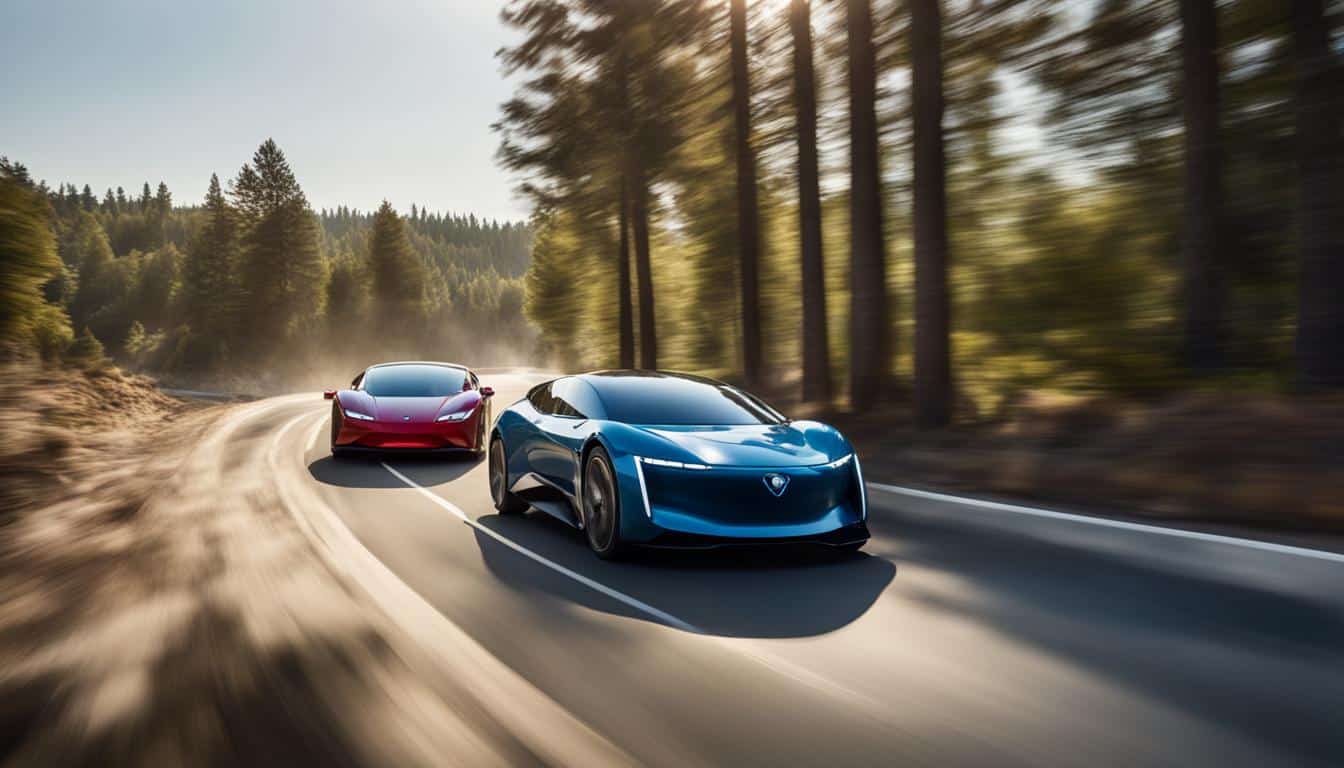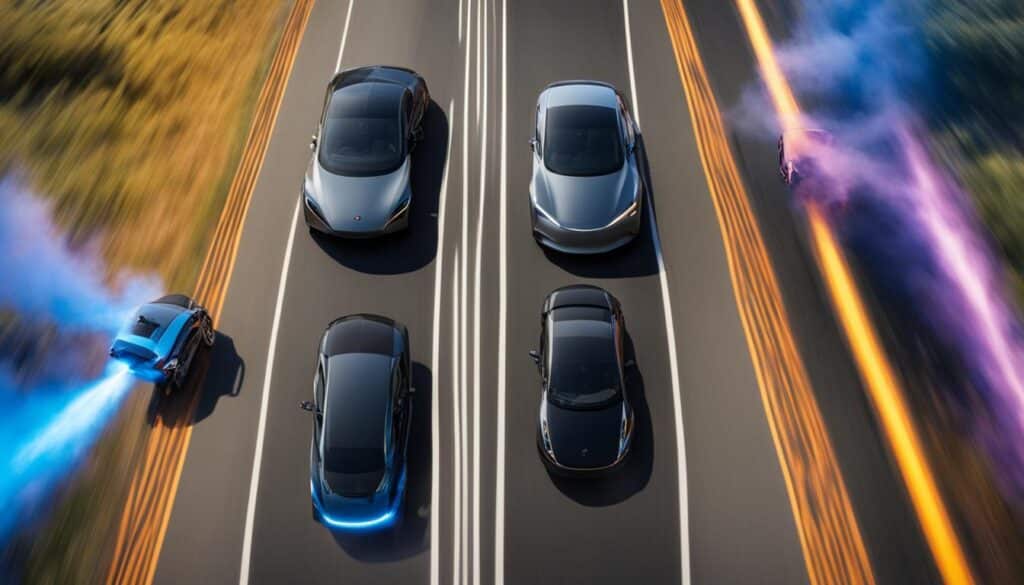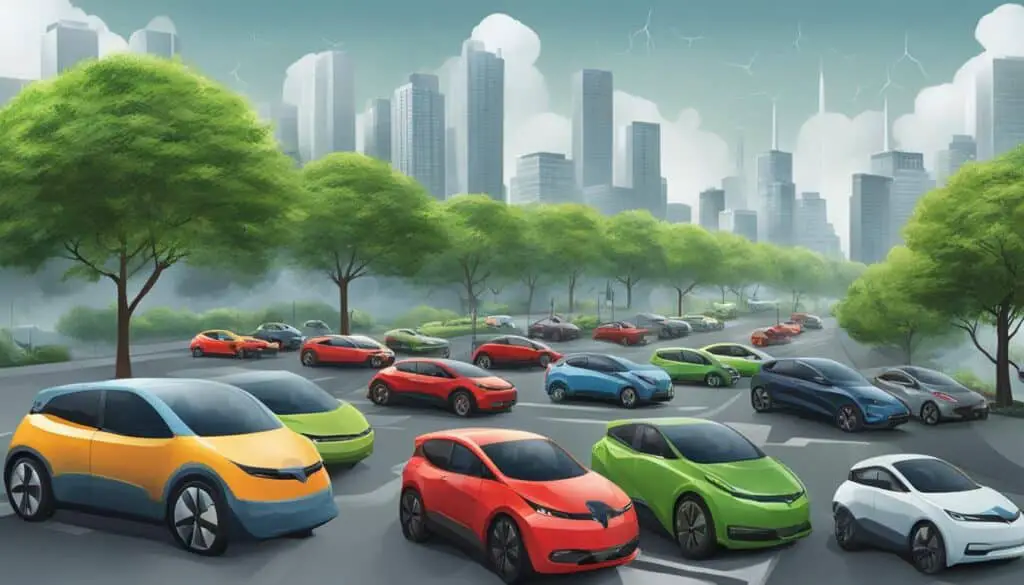
Performance Showdown: Electric Cars vs. Traditional Gasoline Vehicles
When it comes to comparing electric cars (EVs) to traditional gasoline vehicles, performance is a key area of interest. Both types of vehicles have their own unique characteristics and capabilities. In this section, we will delve into the different aspects of performance and highlight the differences between electric cars and gas cars.
Key Takeaways:
- Electric cars and gas cars have distinct performance characteristics.
- Acceleration and top speed may vary between the two vehicle types.
- Range is an important factor to consider for longer journeys.
- Gas cars tend to have better acceleration and higher top speeds than electric cars.
- Electric cars offer instant torque and smooth acceleration.
Electric Cars: Breaking Down The Basics
In this section, I will provide a comprehensive overview of electric cars, including the basics of how they work and the key components that differentiate them from traditional gasoline vehicles. Understanding the fundamental aspects of electric cars is crucial for making informed decisions when considering these eco-friendly alternatives to gas-powered cars.
Electric Motors
At the heart of an electric car is its electric motor. Unlike the internal combustion engines found in gas cars, electric motors use electromagnets to generate mechanical energy. This energy is then transferred to the wheels, propelling the vehicle forward. Electric motors offer instant torque, providing swift and smooth acceleration.
Rechargeable Batteries
Powering electric motors are rechargeable lithium-ion battery packs. These batteries store electrical energy and are responsible for providing the necessary power to propel the vehicle. They have a high energy density, allowing electric cars to travel significant distances on a single charge. However, it’s important to note that the range varies depending on the specific car model and battery capacity.
While lithium-ion batteries are the most common type used in electric cars, there is ongoing research and development to improve their efficiency, energy storage capacity, and charging times. Advancements in battery technology are essential for expanding the range of electric cars and reducing their reliance on charging infrastructure.
Advantages and Limitations
Electric cars offer several advantages over their gasoline counterparts. They are environmentally friendly, producing zero tailpipe emissions, which helps reduce air pollution and combat climate change. Electric cars also require less maintenance compared to gas cars since they have fewer moving parts and don’t need oil changes.
Additionally, electric cars are cheaper to run, as electricity is generally more affordable than gasoline. This cost savings can be significant over the lifetime of owning an electric car. Moreover, electric vehicles benefit from regenerative braking, which converts kinetic energy into electrical energy during braking, allowing for some power recovery.
However, electric cars also have some limitations. High upfront costs and limited model options are still barriers for many consumers. Although the cost of electric vehicles has been decreasing in recent years, they still tend to be more expensive than their gas-powered counterparts. Furthermore, the charging infrastructure for electric cars is not as widespread as gas stations, and longer charging times can be inconvenient for some drivers.
| Advantages | Limitations |
|---|---|
| Environmentally friendly | High upfront costs |
| Low maintenance | Limited model options |
| Cheaper to run | Longer charging times |
| Regenerative braking |
Despite these limitations, the increasing availability of electric cars and the ongoing advancements in technology are making them a viable and sustainable transportation option. As the demand for electric vehicles grows, we can expect further improvements in range, charging infrastructure, and affordability.
In the next section, I will explore the characteristics of traditional gasoline vehicles, shedding light on their advantages and limitations in comparison to electric cars. Stay tuned!
The Old Faithful: Gas Cars
Gas-powered cars, also known as traditional gasoline vehicles, have been the go-to option for transportation for over a century. These vehicles are powered by internal combustion engines that run on gasoline. While electric cars have gained popularity in recent years, gas cars still offer several advantages that make them a reliable choice for many drivers.
Advantages of Gas Cars
Gas cars have a longer range compared to electric cars, allowing drivers to travel greater distances without needing to refuel. Additionally, refueling a gas car is a quick and convenient process, with gas stations readily available in most areas. Gas cars also have the advantage of more affordable upfront costs, making them an attractive option for budget-conscious consumers.
Performance and Flexibility
Gasoline engines provide a level of performance that is often preferred by enthusiasts and drivers who value acceleration and top speed. The internal combustion engine in gas cars can generate instantaneous power, providing quick acceleration when needed. Gas cars also offer a wide range of models and options, allowing drivers to choose from various sizes, styles, and features to suit their preferences and needs.
Environmental Considerations and Maintenance
While gas cars have their benefits, they do contribute to air pollution due to the emissions produced by internal combustion engines. Regular maintenance, including oil changes, filter replacements, and tune-ups, is necessary to keep gas cars running smoothly. Additionally, gas-powered vehicles have higher fuel costs compared to electric cars, which can impact long-term expenses.
Despite these limitations, gas cars continue to be a reliable and familiar choice for many drivers. The widespread availability of gas stations and the performance characteristics of internal combustion engines make gas cars an old faithful option for those seeking reliable transportation.
In the next section, we will compare the engine performance of gas cars and electric cars, exploring their differences in acceleration and top speed.
Gas Cars vs. Electric Cars: Engine Performance Comparison
When it comes to engine performance, there are distinct differences between gas cars and electric cars. Gas cars generally have the edge in terms of acceleration and top speed, thanks to the power output of their gasoline engines.
One of the key advantages of gas cars is their ability to produce instantaneous power, enabling quick acceleration. Gasoline engines are known for their responsive throttle and the ability to generate high torque at low RPMs. This allows gas cars to accelerate rapidly and provide a thrilling driving experience.
Electric cars, on the other hand, have limitations in generating instantaneous power due to the nature of electric motors. While electric motors offer instant torque, they may not match the power output of gasoline engines in terms of sheer acceleration. However, this does not mean that electric cars are slow. Many electric models still offer impressive acceleration, allowing them to go from 0 to 60 mph in a matter of seconds.
Another area where gas cars typically outshine electric cars is in top speed. Gasoline engines can achieve higher speeds due to their advanced designs and the ability to generate more power. Electric cars, although capable of reaching high speeds, may have speed limitations imposed by their battery systems or motor capabilities.
“Gas cars have always been known for their raw power and exhilarating performance. Electric cars are catching up, but for now, gas cars still hold the crown when it comes to engine performance.”
To further enhance their performance, gas cars come with options for tuning and modifications. Enthusiasts can upgrade various engine components, tweak the engine management system, or even install turbochargers or superchargers to significantly increase power output. This customization potential allows gas car owners to push the boundaries of engine performance and achieve even greater acceleration and top speeds.
While electric cars may not match the sheer engine performance of gas cars, they have their own advantages in terms of efficiency, environmental impact, and overall driving experience. The decision between a gas car and an electric car ultimately depends on individual preferences, driving needs, and the desired balance between performance and sustainability.

Gas Cars vs. Electric Cars: Acceleration and Top Speed Comparison
| Gas Cars | Electric Cars |
|---|---|
| Gas cars typically have better acceleration due to instantaneous power output from gasoline engines. | Electric cars offer instant torque, providing impressive acceleration despite limitations in generating instantaneous power. |
| Gas cars can achieve higher top speeds thanks to their advanced engine designs and power output. | Electric cars may have speed limitations imposed by battery systems or motor capabilities, but they can still reach high speeds. |
Environmental Impact: Electric Cars vs. Gas Cars
When it comes to the environmental impact, electric cars have a clear advantage over gas cars. Electric cars produce zero tailpipe emissions, which means they do not release any harmful pollutants into the air. This significantly reduces air pollution and helps to mitigate the negative effects of greenhouse gas emissions on climate change.
On the other hand, gas cars contribute to air pollution through the combustion of gasoline in their internal combustion engines. This combustion process releases various pollutants such as nitrogen oxides (NOx), carbon monoxide (CO), and particulate matter (PM). These emissions can have detrimental effects on air quality and human health.
Not only do electric cars produce cleaner emissions, but they are also more energy-efficient compared to gas cars. Electric cars convert a higher percentage of the stored energy from their batteries into motion, resulting in less wasted energy. This energy efficiency not only reduces the overall environmental impact but also translates into cost savings for the driver.

However, it’s important to note that the production and disposal of electric car batteries have their own environmental concerns. The mining and extraction of raw materials, such as lithium and cobalt, used in these batteries can have adverse effects on ecosystems and communities near mining sites. Additionally, proper disposal and recycling of batteries are essential to minimize the environmental impact at the end of their lifespan.
Overall, electric cars offer a significant reduction in emissions and a higher level of energy efficiency compared to gas cars. While there are still challenges related to battery production and disposal, the environmental benefits of electric cars make them a more sustainable choice for the future of transportation.
Conclusion
Choosing the right vehicle, whether it be an electric car or a gas car, is a decision that should be based on individual needs, preferences, and budget. Electric cars have clear advantages when it comes to environmental impact, as they produce zero tailpipe emissions and are more energy-efficient. They are also quieter and generally cheaper to maintain compared to gas cars. On the other hand, gas cars offer a longer range and faster refueling times, making them more suitable for long-distance driving and areas with limited charging infrastructure.
When choosing between an electric car and a gas car, it’s essential to consider factors such as performance, environmental impact, and infrastructure availability. Electric cars excel in city driving, where their instant torque and quiet operation make them a joy to drive. Gas cars, with their more powerful engines, tend to have better acceleration and higher top speeds.
In conclusion, the choice between electric cars and gas cars ultimately depends on your priorities and circumstances. If you prioritize sustainability, cost-effectiveness, and a quieter driving experience, an electric car may be the right choice for you. However, if you require longer range capabilities and faster refueling times, a gas car may better suit your needs. It’s important to evaluate your lifestyle and driving habits to make an informed decision that aligns with your values and preferences.
FAQ
How do electric cars compare to traditional gasoline vehicles in terms of performance?
Electric cars and gas cars have different performance characteristics. While gas cars generally have better acceleration and higher top speeds, electric cars offer unique benefits such as instant torque and a smoother, quieter driving experience.
What powers electric cars?
Electric cars are powered by electric motors that derive their energy from rechargeable lithium-ion battery packs.
What powers gas cars?
Gas cars are powered by internal combustion engines that run on gasoline.
Which type of car is more environmentally friendly?
Electric cars have a lower environmental impact as they produce zero tailpipe emissions. They help reduce air pollution and greenhouse gas emissions. On the other hand, gas cars contribute to air pollution.
What are the advantages of gas cars over electric cars?
Gas cars have a longer range, faster refueling times, and more affordable upfront costs compared to electric cars.
What are the advantages of electric cars over gas cars?
Electric cars offer benefits such as being environmentally friendly, low maintenance, and cheaper to run in the long term.
Can electric cars accelerate as quickly as gas cars?
Gas cars generally have better acceleration due to the power output of their engines. Gasoline engines can produce instantaneous power for quick acceleration, while electric motors have limitations in generating instantaneous power.
Are electric cars more energy-efficient than gas cars?
Yes, electric cars are more energy-efficient as they convert more of the stored energy into motion compared to gas cars.
What factors should I consider when choosing between an electric car and a gas car?
Factors to consider include individual needs, preferences, and budget. Electric cars are better for the environment, quieter, and cheaper to maintain, while gas cars offer a longer range and faster refueling times.
Are there any environmental concerns associated with electric cars?
While electric cars have a lower environmental impact during usage, the production and disposal of electric car batteries have their own environmental concerns.
